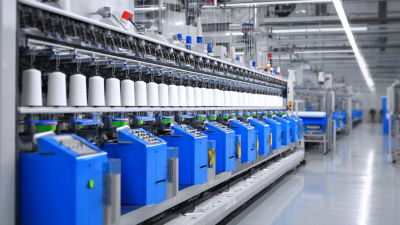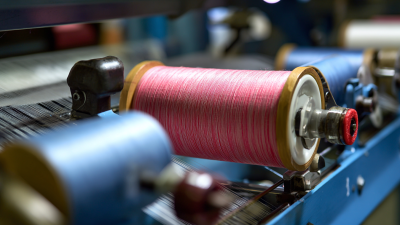Leave Your Message
The textile manufacturing industry is on the brink of transformation, driven by advancements in technology and innovation. One of the most exciting developments in this realm is the rise of Automatic Viscose Equipment, which promises to revolutionize the production process of viscose fibers. As demand for sustainable and high-quality textiles grows, manufacturers are increasingly turning to automation to enhance efficiency, reduce costs, and minimize environmental impact. This groundbreaking equipment not only streamlines operations but also ensures consistent quality in the production of viscose fabric, which is known for its softness and versatility. In this exploration, we will delve into the features and benefits of Automatic Viscose Equipment, highlighting its potential to redefine the future of textile manufacturing in an ever-evolving market.

Automation is transforming the textile manufacturing landscape, particularly in the production of viscose fabrics. By integrating advanced automatic equipment, manufacturers are seeing significant increases in efficiency. The automation of viscose production processes minimizes human intervention, which reduces the likelihood of errors and inconsistencies.
 Automated systems can operate continuously, ensuring a steady output that meets the growing demand for viscose textiles without compromising on quality.
Automated systems can operate continuously, ensuring a steady output that meets the growing demand for viscose textiles without compromising on quality.
Moreover, the impact of automation extends beyond just production speed. It allows for precise control over various parameters, such as temperature and viscosity, leading to improved fabric properties. This enhanced control translates to better resource management, which notably decreases waste and energy consumption.
As companies invest in automated viscose equipment, the overall cost of production diminishes, encouraging sustainable practices within the industry while maintaining competitive pricing. The future of viscose textile production is undoubtedly aligned with the advancements in automation, promising a more efficient and eco-friendly approach to manufacturing.
The textile manufacturing industry is undergoing a significant transformation with the advent of innovative technologies designed to enhance viscose equipment. These advancements focus on automation, efficiency, and sustainability, revolutionizing how viscose is produced. By integrating cutting-edge sensors and smart algorithms, manufacturers can now monitor production processes in real-time, ensuring optimal performance and minimal waste. This technology not only speeds up production but also enhances the quality of the final product.
Moreover, the design of viscose equipment is being reimagined to accommodate these advanced technologies. Modular setups and flexible configurations allow for easier adaptations to varying production demands. This capability is crucial as the fashion industry increasingly shifts toward more globalized and fast-paced production cycles. Additionally, energy-efficient systems and eco-friendly materials are becoming integral components, aligning with the growing consumer demand for sustainable practices in textile manufacturing. These innovations are setting the stage for a more responsible and efficient future in viscose production.
| Technology | Feature | Impact | Efficiency Gain (%) |
|---|---|---|---|
| Automated Spinning Machines | High-speed production | Increased output | 30 |
| Smart Dyeing Systems | Automatic color matching | Reduced waste | 25 |
| Robotic Fabric Inspection | Real-time defect detection | Improved quality control | 40 |
| Data Analytics Integration | Predictive maintenance | Lower downtime | 20 |
| Energy-efficient Equipment | Lower energy consumption | Cost savings | 15 |
The automatic viscose manufacturing process is at the forefront of sustainable textile production, emphasizing eco-friendly practices that significantly reduce environmental impact. Traditional viscose production has faced criticism due to its resource-intensive nature and the use of toxic chemicals. However, advancements in automatic equipment have introduced technologies that minimize water consumption and energy use while improving efficiency. By integrating closed-loop systems, manufacturers can recycle chemicals, ensuring that harmful substances do not contaminate the water supply, thus promoting a cleaner production cycle.
Moreover, the shift towards sustainability in automatic viscose equipment aligns with the growing demand for transparency in the textile industry. Consumers are increasingly aware of the environmental footprint of their purchases, driving manufacturers to adopt practices that not only enhance productivity but also prioritize ecological balance. Innovative solutions such as using renewable energy sources and biodegradable solvents are becoming commonplace, enabling facilities to meet both regulatory standards and consumer expectations. This evolution not only supports the planet but also positions companies as leaders in a marketplace that values sustainability.
The integration of digital solutions in textile machinery operations signifies a pivotal shift towards Industry 4.0, where traditional manufacturing meets cutting-edge technology. Recent advancements in Internet of Things (IoT) platforms enable seamless communication between operational technology (OT) and information technology (IT). This interoperability allows manufacturers to harness real-time data analytics, optimizing production processes and enhancing overall efficiency.
In particular, the emergence of smart knitting machines demonstrates how artificial intelligence and automation can transform textile production. By leveraging digital tools, manufacturers can minimize waste, improve sustainability practices, and respond swiftly to market demands. Further, as the spinning and weaving machine markets continue to grow, companies are increasingly adopting these smart technologies to maintain a competitive edge, ensuring that they meet the evolving needs of the industry while driving innovation in textile manufacturing.
The future of automatic viscose equipment is poised to significantly shape the textile manufacturing industry. Emerging trends focus on enhanced automation and sustainability, driven by technological advancements. As manufacturers increasingly adopt Industry 4.0 principles, incorporating IoT connectivity and data analytics into viscose production processes, efficiency is expected to rise dramatically. The ability to monitor and manage equipment in real-time will not only streamline operations but also minimize waste, leading to a more responsible production cycle.

Moreover, industry standards are evolving in response to growing environmental concerns. Stricter regulations are being implemented to govern the use of chemicals and the overall environmental impact of viscose production. Automatic viscose equipment is adapting to these changes by integrating eco-friendly technologies, such as closed-loop systems that recycle water and solvents. This not only enhances compliance with environmental standards but also appeals to a consumer base that increasingly prioritizes sustainability in their purchasing decisions. The interplay of technology and regulatory frameworks will ultimately define the trajectory of viscose manufacturing, ensuring a more sustainable and innovative future for the textile sector.






